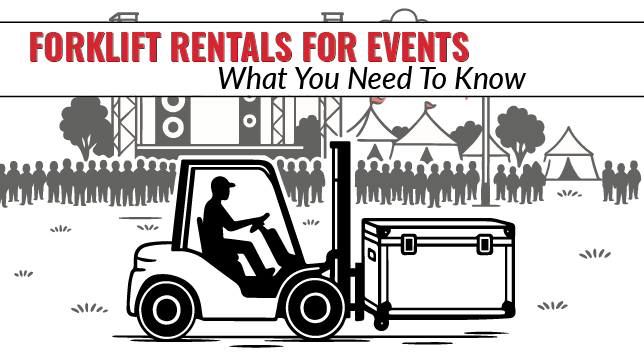Forklifts play an essential role in event logistics. From music festivals to trade shows, these machines handle heavy lifting that would otherwise require significant time and manpower.
For event planners, understanding forklift rental options is key to a smooth setup and teardown. If you’re wondering what you can expect to pay to rent a forklift for a day or what type of forklift best suits a stage setup, this guide covers everything you need to know about event forklift rental services.
Let’s dive in!
Why Forklifts Are Essential for Event Logistics
Large events involve moving heavy equipment, supplies, and structures. Forklifts are the workhorses that make this possible as they can transport pallets of materials, raise trusses for stages, and position bulky decor or equipment with precision. In short, forklifts dramatically speed up event load-in and load-out, allowing tight event schedules to stay on track.
Without a forklift, tasks like unloading a truck full of sound equipment or setting up a stage would be far slower and riskier.
Use Cases in Event Settings
Forklifts find uses in many event scenarios, including:
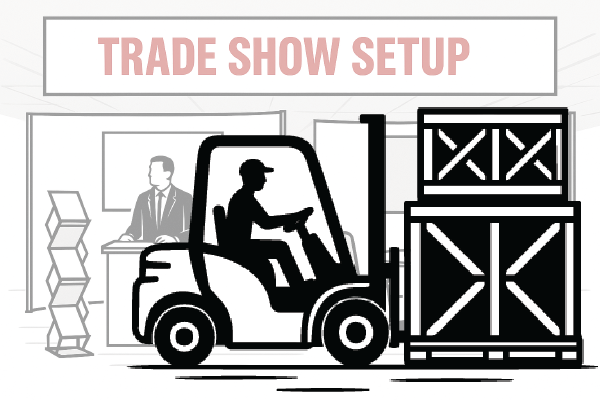
Trade show setup
Unloading and positioning heavy exhibition crates, displays, and pallets of product at convention centers. A forklift can swiftly bring booth materials from loading docks to the show floor, saving exhibitors hours of manual labor.
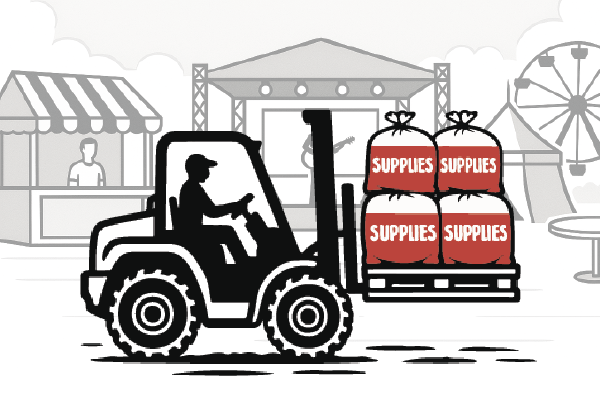
Festivals
Moving pallets of supplies, beverages, and staging elements across large outdoor venues. At festivals, most forklifts are used for moving goods, plywood, lifting stage truss, and installing signage or lighting. Rough-terrain forklifts with high clearance often navigate fields or fairgrounds to deliver gear where it’s needed.
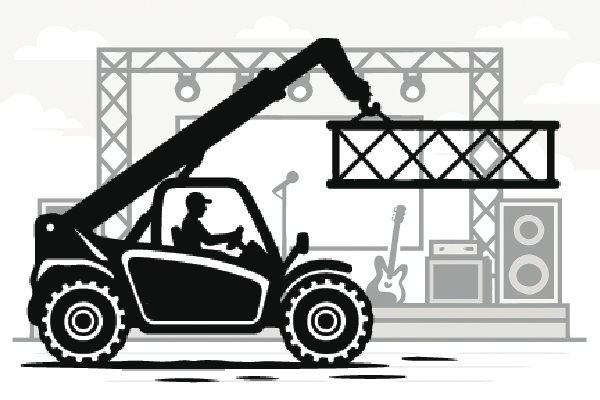
Stage and structural setup
Lifting truss sections, speakers, lighting rigs, and other stage components into place. A stage setup forklift (often a telehandler or boom forklift) can raise heavy lighting trusses or roof pieces that crew members alone could never lift safely.
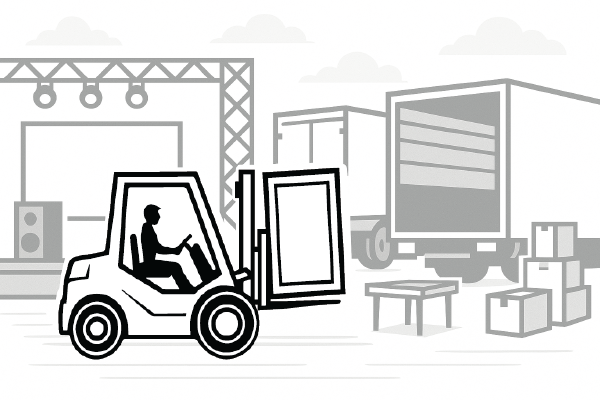
Booth transport and dismantling
Assisting with moving and tearing down large vendor booths or sets. Forklifts can carry heavy booth panels, flooring, and rental furniture back to trucks efficiently during strike (tear-down), preventing bottlenecks at loading bays.
Benefits of Using a Forklift at Events
Using a forklift at events offers clear advantages:

Speeding up load-in/load-out
Forklifts drastically reduce the time required to move equipment compared to teams of staff with dollies. What might take hours by hand (like unloading several tons of staging) can often be done in minutes with a forklift.

Minimizing manual labor
By handling the heavy lifting, forklifts reduce strain and fatigue on your crew. This not only improves efficiency but also lowers the risk of injuries from lifting accidents. (Forklifts carry thousands of pounds per load, far beyond what a group of staff could manage safely.)

Handling large or heavy equipment
Many events involve oversized items – from giant LED screens to generators or stacks of barricades. A forklift provides the muscle to safely lift and position heavy equipment that would be impossible to move otherwise. This ensures you can incorporate ambitious staging or displays into your event without worrying about how to move them.
Short-Term & Seasonal Forklift Rental Options
One of the great things about forklift rentals is their flexibility. You can secure a forklift only for the period you actually need it, which is perfect for events. Whether it’s a one-day conference or a summer-long festival series, rental agreements can be tailored accordingly. Choosing a short-term forklift rental means you avoid long commitments and hefty purchase costs, while still getting the equipment on site when required. Below we outline rental duration options and considerations for event planners.
Flexible Rental Durations
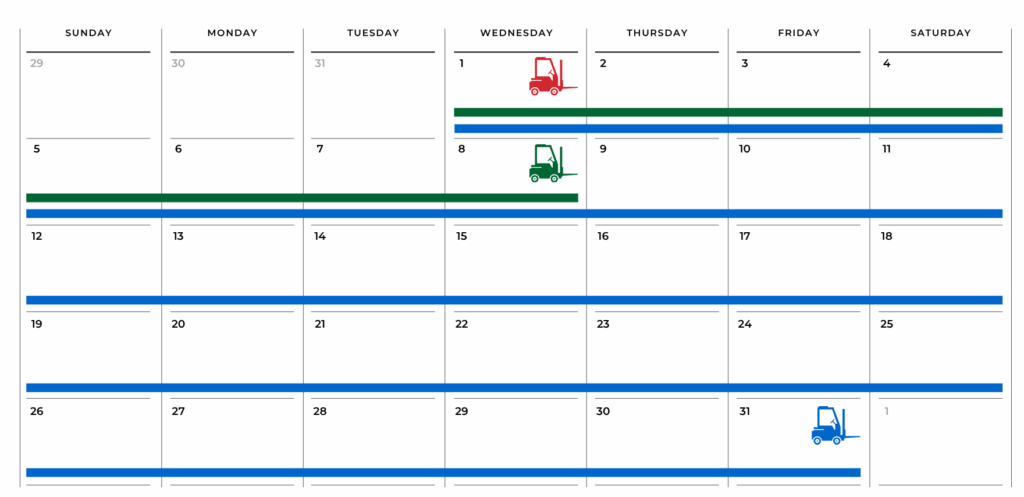
Rental companies offer a range of durations to suit event needs:
Renting a forklift for a day
Need a forklift just for setup or teardown day? Many providers offer daily rentals (often defined as an 8-hour use day). This option is ideal for one-off needs like a single-day event setup. You get the forklift on the specific day of setup, and once the job is done, it’s returned – no ongoing costs.
Short-term forklift rental
If your event spans multiple days or you have a week of preparation, short-term rentals (multi-day or weekly) fill the gap. For example, you might rent a forklift from Tuesday through Friday to handle a trade show install and dismantle. Short-term rentals ensure you have the machine available throughout your event window without paying for unnecessary extra days.
Seasonal rental agreements
For busy seasons or a series of back-to-back events, consider renting a forklift for a month or an entire season. Seasonal rentals are common for festival organizers who may host events across a few months. This longer arrangement often comes at a lower average daily cost than repeated one-day rentals (rental companies typically discount the rate for extended durations). In effect, renting for a week or month can be more cost-effective compared to paying the daily rate repeatedly.
Cost Considerations
Cost is naturally a big question for planners. Here are some common event forklift models and a ballpark cost for your considerations:
| Event Forklift Type | Per Day Price |
| 5,000 lb capacity forklift | $310 – $474 |
| High-capacity telehandlers | $770 – $987 |
| 10,000 lb rough-terrain forklift | $453 – $666 |
Note: These averages were compiled from forklift rental listings across 10 major U.S. cities, including Milwaukee, Chicago, Minneapolis, Atlanta, Dallas–Fort Worth, Phoenix, Orlando, Los Angeles, Denver, and New York. Prices reflect base equipment rental only and do not include freight, fuel, damage waivers, or other potential fees.
Forklift Types & Capabilities for Event Use
Not all forklifts are the same. Selecting the right type of forklift for your event ensures you get the job done efficiently and safely. Two key factors to consider are the model/type of forklift and its lift capacity. For example, an indoor expo will favor a quiet electric forklift, while an outdoor festival might require a rugged all-terrain model. Matching the forklift’s capabilities to your event environment and load requirements is crucial.
Popular Models for Events
Event planners typically rent two broad categories of forklifts, depending on venue and terrain:
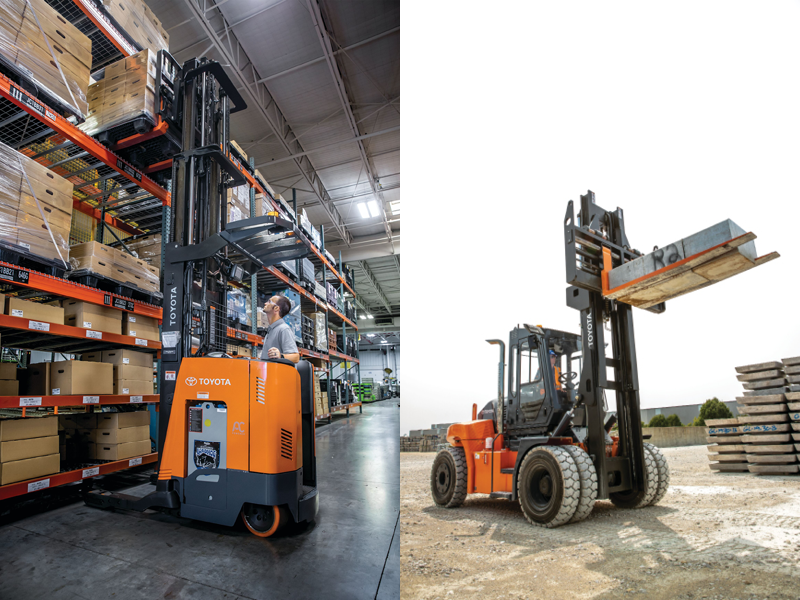
Electric forklifts
Electric forklifts are battery-powered and produce no exhaust, making them perfect for indoor events like conventions, trade shows, or concerts inside arenas. They run quietly and won’t fill your venue with fumes – a big plus for guest comfort and compliance with indoor air quality rules.
Electric models usually have cushion tires (smooth rubber) suited for flat surfaces. If you’re setting up an expo in a convention center or moving gear on a hotel ballroom floor, an electric forklift will get the job done without disturbing the environment. Just ensure you have a charging plan if the rental extends multiple days.
Rough terrain forklifts
Outdoor events often require forklifts that can handle uneven ground, grass, or gravel. Rough terrain forklifts (including telehandlers and all-terrain straight-mast forklifts) are built for this. They feature large pneumatic tires, higher ground clearance, and often four-wheel drive.
These machines can traverse dirt fields or fairgrounds without getting stuck. If your event is on a farm, beach, or park lawn, you’ll likely need a rough terrain model. Telehandlers (boom forklifts) also provide extra reach, allowing you to lift equipment high (useful for stacking stage components or placing gear onto elevated platforms).
Lift Capacities

Choosing a forklift with the right lifting capacity is vital for safety. You need a machine that can handle the heaviest load you’ll encounter:
Choosing the right lift capacity for your needs
Forklift capacity is measured in pounds (or kilograms), indicating the maximum weight it can lift. Common rental forklifts for events range from about 3,000 lbs capacity (small electric units) up to 10,000+ lbs (heavier telehandlers or diesel forklifts).
Assess your equipment: what’s the heaviest single item or pallet you must move? For example, a pallet of bottled water might weigh ~2,000 lbs, truss segments on a fork could be 500–1,000 lbs each, and some stage components or large generators could be several thousand pounds. You’ll want a forklift rated comfortably above that weight. It’s recommended to have some margin (don’t push a forklift right to its limit on every lift).
Common weight requirements in event logistics
Most event logistics can be handled by forklifts in the 5,000 to 6,000 lb capacity range, as these are beefy enough for staging gear but still compact. However, specialized situations might demand more. For instance, if you need to lift a particularly heavy piece of equipment (like a 8,000 lb concrete ballast or a large concert speaker cluster in a roadcase), you might require an 8k or 10k capacity model.
Always inventory your heaviest items – and remember to account for any lift height needs too. Forklifts have lower effective capacity at high lift heights due to stability limits, so if you must lift something very heavy to the top of a stage or scaffolding, factor that in. When in doubt, consult the rental provider; they can recommend an appropriate capacity after hearing what you need to move.
Safety and Compliance
Safety is paramount when using forklifts, especially in event settings where you may have staff, vendors, or even attendees nearby during setup. Forklifts are powerful machines that must be operated correctly to prevent accidents. This includes using certified operators, performing proper equipment checks, and having the right insurance in place. Here’s how to ensure safety and compliance when renting a forklift for events.
Certified Forklift Operators Available
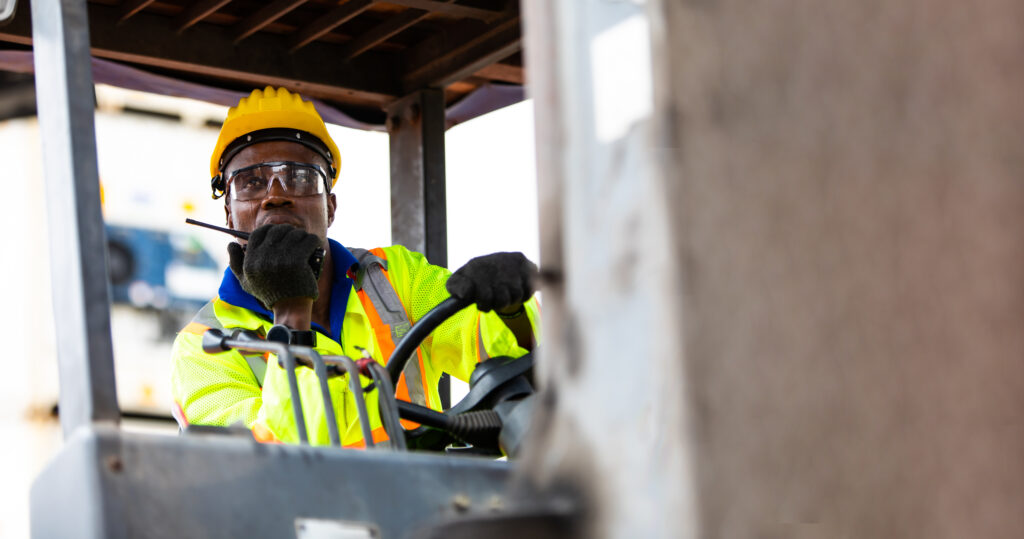
Only trained and certified individuals should operate a forklift. OSHA regulations in the U.S. require that all forklift operators be trained and this isn’t just a suggestion, it’s the law for workplaces. What does this mean for an event planner? If you have someone on your team who will drive the forklift, make sure they have up-to-date forklift operator certification.
If not, you have a couple of options:
Rental with operator
Many equipment rental companies offer certified operators for hire alongside the forklift. This can be a smart choice if you don’t have a qualified operator on staff. By getting a trained professional, you ensure the job is done efficiently and safely. It’s worry-free – the operator handles the machine while you focus on other event tasks.
Third-party operators or labor services
Alternatively, you might hire a certified freelance operator or use a staffing service that provides licensed forklift drivers for events. However, always verify credentials and ensure they understand your timeline and needs.
Having a licensed operator not only keeps everyone safe but also may be required by venues. Some venues and municipalities explicitly mandate proof of operator training for anyone driving a forklift on site. Complying with these rules helps avoid liability issues and keeps your event running without safety hiccups.
Safety Inspection Checklist

Before any forklift revs up at your venue, it should undergo a safety check. Daily, pre-shift inspection of powered industrial trucks is required by OSHA, and this applies to your rental forklift as well. Even though rental machines are typically well-maintained, you’ll want to ensure everything is in order each day it’s in use. Learn more about inspection checklist here.
Liability and Insurance
Accidents involving forklifts at events are rare when proper procedures are followed, but having the right insurance is essential to mitigate potential risks. Most rental companies offer damage waivers that cover physical damage to the equipment but not liability for injuries or third-party property damage.
It’s important to verify insurance requirements with both the rental provider and venue in advance and confirm coverage for any personnel involved. Securing appropriate insurance ensures financial protection in the event of equipment damage or injury.
Event Equipment & Heavy Machinery Rentals
Forklifts often aren’t the only equipment you’ll need for a large event. Event logistics can call for an array of machinery and tools – and bundling these rentals can save you time and money. Instead of sourcing each piece separately, many planners get forklifts, aerial lifts, and other gear from the same rental provider as a package.
Beyond Forklifts
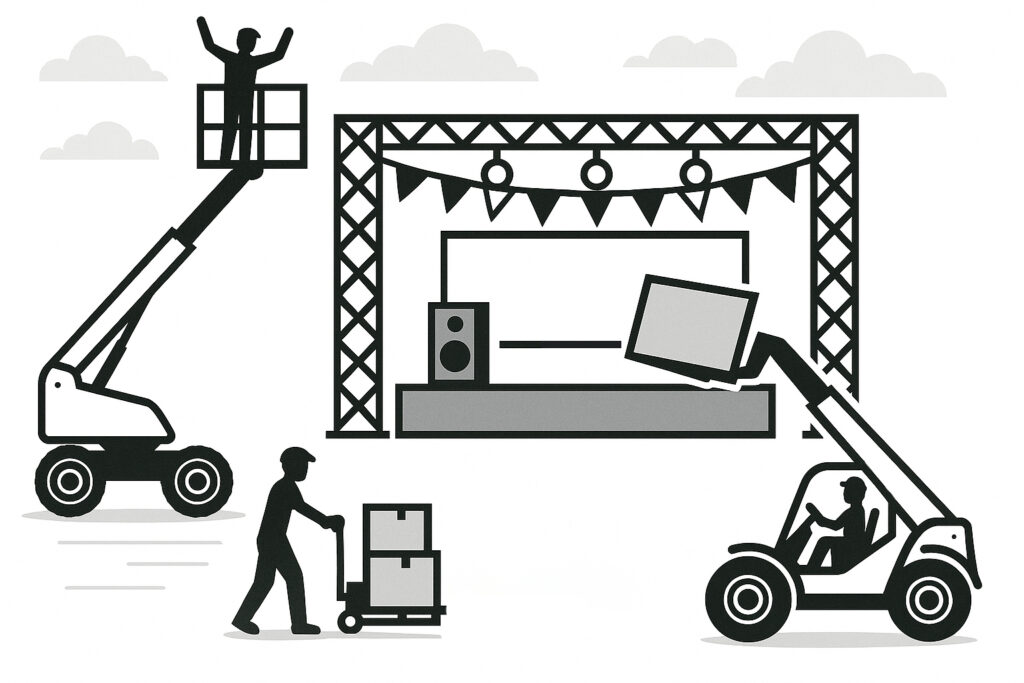
When planning event setup, it’s important to consider all necessary equipment beyond just forklifts.
Aerial lifts such as boom lifts and scissor lifts are essential for overhead tasks like rigging lights or hanging banners, while smaller tools like pallet jacks, dollies, and carts assist with tight-space maneuvering and transporting smaller loads.
Depending on your event, you may also need additional heavy equipment like generators, light towers, or telehandlers for specialized tasks. Bundling these rentals with a single provider can offer significant advantages, including cost savings, simplified logistics, and consistent support.
Rental companies often provide package deals and dedicated coordinators to streamline your experience and ensure smooth operations from delivery to setup. Taking a comprehensive approach to equipment planning not only boosts efficiency but also reduces stress and expenses.
Logistics Support
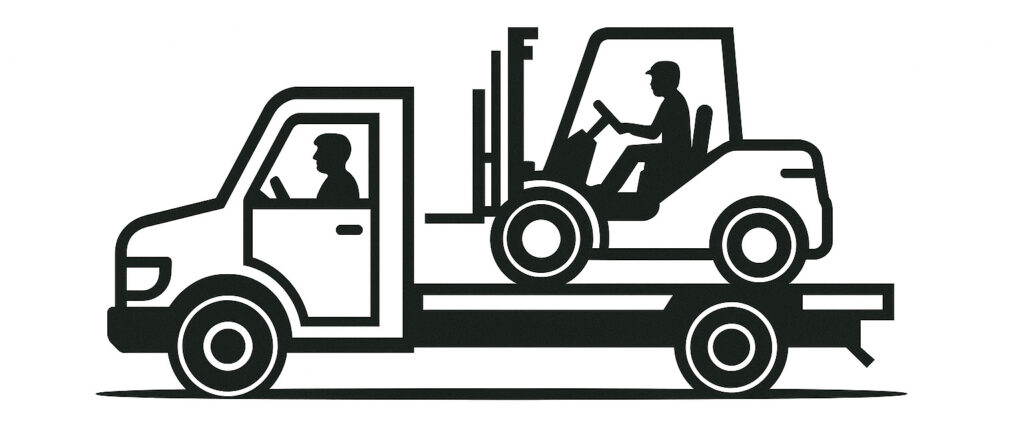
When your forklift and other gear are on the way, a bit of coordination will ensure everything goes smoothly:
Delivery, setup, and pickup
Plan the delivery for when someone from your team can be on-site to meet the truck. Forklifts are typically delivered on a flatbed or trailer. If there’s no loading dock, the rental company might send a tilt-bed truck that can lower the forklift to ground level. Ensure the drop-off point is accessible (check for any height or weight restrictions on entry ways, etc.).
Once delivered, the rental technician may give a quick run-through of the equipment if needed. After the event, coordinate the pickup time and confirm if the forklift needs to be refueled or charged before return (some contracts require you to top off fuel, or they charge a fee). Having it ready at a convenient pickup spot will speed up the process and prevent any extra charges for the rental company’s driver waiting around.
Coordination with event teams or venues
Communication is key. Let your event team know when the forklift will be moving around, especially if other setup activities are happening concurrently. You may need to establish a “no foot traffic” zone when the forklift is in operation for safety. Also, inform the venue management about your equipment schedule. Some venues have rules – for example, limited hours when forklifts can be operated (to avoid disturbing neighbors or other events), or specific routes they must take inside a building.
If your event is in a public place, you might even need a permit for operating machinery on site (common for things like street festivals). Work these details out beforehand: it avoids surprises like the venue telling you on the day, “You can’t drive that forklift through this hall.” With proper coordination, the forklift integration into your event setup will be seamless and efficient, fitting in with all the moving pieces of your event production.
Conclusion
Renting a forklift for your event can significantly streamline logistics, reduce labor strain, and ensure the safe and efficient handling of heavy equipment—whether you’re managing a trade show, festival, or stage production. With flexible rental options, various models tailored to indoor and outdoor needs, and the ability to bundle with other essential machinery, forklifts offer tremendous value for event planners aiming for smooth setups and teardowns. By planning ahead, ensuring certified operation, and coordinating with venues and rental providers, you’ll keep your event on track and hassle-free from start to finish.
